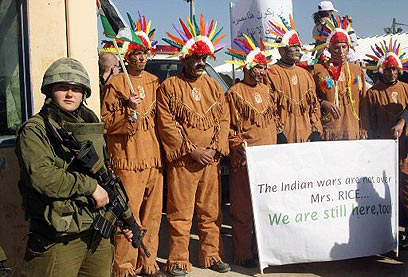But let's get to the point. Are you really so stupid that you haven't noticed the theme of this blog? Even though it's staring you in front of your face every time you visit the page? It's the intersection of Native American and pop culture, dumbass--not the comprehensive reporting of racism, oppression, and terrorism around the world.
I post items on Israel only when they have a Native connection, dumbass. How many articles on Iran, Saudi Arabia, Cuba, etc. have a Native connection, and how many of them have I omitted? Go ahead and answer these questions, dumbass. Put up or shut up.
Stephen cites WND
http://www.masada2000.org/been-had.html
The fact simply is that there are no Palestinians. These people are Arabs like all other Arabs, and they happen to live in a region called Palestine. They are not a separate people.
Because I've used a word commonly found in political negotiations, the media, and the dictionary, Stephen concludes I'm ignorant:
In March 2006 Republican Colorado State Representative Jim Welker was criticized for forwarding a WorldNetDaily commentary by Jesse Lee Peterson. Congressmen criticized Welker for uncritically sending a copy of the article by email, which included the statements "President Bush is not to blame for the rampant immorality of blacks" and accused "welfare-pampered blacks" of waiting for the federal government to save them from Hurricane Katrina.
On September 13, 2001, WND published a commentary by Anthony C. LoBaido regarding the terrorist attacks on New York City and Washington two days earlier. In his column, LoBaido outlined what he regarded as the moral depravity of America in general and New York in particular, asking whether, "God (has) raised up Shiite Islam as a sword against America."
A commentary by Canadian evangelical Tristan Emmanuel decried so called "Anglo-Saxon self-hatred" in Canada and the United States, and used "warring factions" of third world immigrants as a base against multiculturalism in order to suggest a whites-only immigration policy for North America.
During the closing days of the 2008 presidential campaign, and in the weeks following Barack Obama's election as president of the United States, WorldNetDaily posted numerous articles that advanced conspiracy theories about his citizenship status, alleging he is not constitutionally eligible to be president because he is not a natural-born citizen and that his Hawaiian birth certificate is a forgery
In a February 10, 2009, column, Janet Porter further alleged that President Obama was acting as a mole for the Soviet Union. Porter suggested that Obama was raised as an atheist and Communist and was subsequently trained by Soviet agents during the early 1990s.
On to the Palestinian "myth"
But wait...there's more. Here's how much of an idiot you are, Stephen:
This point also encompasses the Indian nations in the United States and Canada. Although they had an inherent right to govern themselves, I doubt many of them considered themselves nations akin to Great Britain, Russia, or China. Now they do.
Since you think I'm ignorant, you can read some of what I know about Palestinians below. Maybe you won't sound so ignorant the next time you open your mouth.
Palestinian nationalism
Baruch Kimmerling and Joel S. Migdal consider the 1834 revolt of the Arabs in Palestine as constituting the first formative event of the Palestinian people. Under the Ottomans, Palestine's Arab population mostly saw themselves as Ottoman subjects. In the 1830s however, Palestine was occupied by the Egyptian vassal of the Ottomans, Muhammad Ali and his son Ibrahim Pasha. The revolt was precipitated by popular resistance against heavy demands for conscripts, as peasants were well aware that conscription was little more than a death sentence. Starting in May 1834 the rebels took many cities, among them Jerusalem, Hebron and Nablus. In response, Ibrahim Pasha sent in an army, finally defeating the last rebels on 4 August in Hebron. Nevertheless, Benny Morris argues that the Arabs in Palestine remained part of a larger Pan-Islamist or Pan-Arab national movement.
Rashid Khalidi argues that the modern national identity of Palestinians has its roots in nationalist discourses that emerged among the peoples of the Ottoman empire in the late 19th century, and which sharpened following the demarcation of modern nation-state boundaries in the Middle East after World War I. Khalidi also states that although the challenge posed by Zionism played a role in shaping this identity, that "it is a serious mistake to suggest that Palestinian identity emerged mainly as a response to Zionism."
Historian James L. Gelvin argues that Palestinian nationalism was a direct reaction to Zionism. In his book The Israel-Palestine Conflict: One Hundred Years of War he states that "Palestinian nationalism emerged during the interwar period in response to Zionist immigration and settlement." Gelvin argues that this fact does not make the Palestinian identity any less legitimate:
For more on the subject, see The Indian-Palestinian Connection.
Below: Palestinians dress as (stereotypical) Indians because they both seek their sovereign rights.


No comments:
Post a Comment